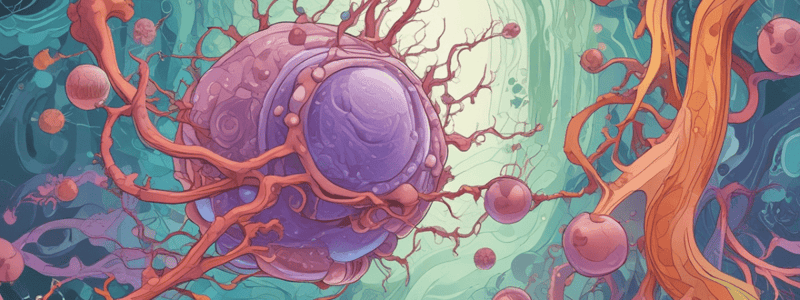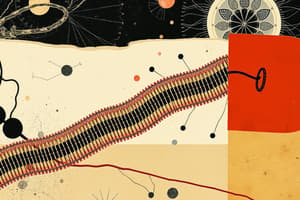Podcast
Questions and Answers
Match the following cell components with their functions: change
Match the following cell components with their functions: change
Cell membrane change = semi-permeable membrane surrounding the cell Cytoplasm = jelly-like substance inside the cell membrane Nucleus = control center of the cell where DNA is stored Organelles = specialized structures within the cell
Match the following genetic terms with their definitions:
Match the following genetic terms with their definitions:
DNA = molecule containing genetic information Genes = sequences of DNA that encode proteins Expression = process of creating a protein from a gene Inheritance = passing of genetic traits from parents to offspring
Match the following evolutionary mechanisms with their descriptions:
Match the following evolutionary mechanisms with their descriptions:
Mutation = change in DNA sequence Genetic drift = random change in gene frequency Natural selection = survival and reproduction of individuals with advantageous traits Fossil record = evidence of evolution
Match the following biological molecules with their functions:
Match the following biological molecules with their functions:
Flashcards are hidden until you start studying
Study Notes
Definition and Branches
- Biology: the scientific study of life and living organisms
- Branches:
- Botany: study of plants
- Zoology: study of animals
- Microbiology: study of microorganisms
- Ecology: study of interactions between organisms and their environment
Cell Biology
- Cell: basic structural and functional unit of life
- Cell membrane: semi-permeable membrane surrounding the cell
- Cytoplasm: jelly-like substance inside the cell membrane
- Nucleus: control center of the cell where DNA is stored
- Organelles: specialized structures within the cell (e.g. mitochondria, ribosomes)
Genetics
- DNA (Deoxyribonucleic acid): molecule containing genetic information
- Double helix structure
- Composed of nucleotides (A, C, G, T)
- Genes: sequences of DNA that encode proteins
- Expression: process of creating a protein from a gene
- Inheritance: passing of genetic traits from parents to offspring
Evolution
- Theory of Evolution: process of change in species over time
- Mechanisms:
- Mutation: change in DNA sequence
- Genetic drift: random change in gene frequency
- Natural selection: survival and reproduction of individuals with advantageous traits
- Evidence:
- Fossil record
- Comparative anatomy and embryology
- Molecular biology
- Mechanisms:
Ecology
- Ecosystem: community of organisms and their environment
- Energy flow: movement of energy through the ecosystem (producer, consumer, decomposer)
- Nutrient cycling: recycling of nutrients (water, carbon, nitrogen)
- Population dynamics: study of population growth and decline
Biological Molecules
- Carbohydrates: energy storage molecules (sugars, starches, cellulose)
- Proteins: structural and functional molecules (enzymes, hormones, structural proteins)
- Lipids: energy storage molecules (fats, oils)
- Nucleic acids: genetic material (DNA, RNA)
Biology
- Scientific study of life and living organisms
- Branches include Botany, Zoology, Microbiology, and Ecology
Cell Structure
Cell Membrane
- Semi-permeable membrane surrounding the cell
Cytoplasm
- Jelly-like substance inside the cell membrane
Nucleus
- Control center of the cell where DNA is stored
Organelles
- Specialized structures within the cell (e.g. mitochondria, ribosomes)
Genetics
DNA
- Molecule containing genetic information
- Double helix structure composed of nucleotides (A, C, G, T)
Genes
- Sequences of DNA that encode proteins
- Expression: process of creating a protein from a gene
- Inheritance: passing of genetic traits from parents to offspring
Evolution
Theory of Evolution
- Process of change in species over time
Mechanisms of Evolution
- Mutation: change in DNA sequence
- Genetic drift: random change in gene frequency
- Natural selection: survival and reproduction of individuals with advantageous traits
Evidence for Evolution
- Fossil record
- Comparative anatomy and embryology
- Molecular biology
Ecology
Ecosystem
- Community of organisms and their environment
Energy Flow
- Movement of energy through the ecosystem (producer, consumer, decomposer)
Nutrient Cycling
- Recycling of nutrients (water, carbon, nitrogen)
Population Dynamics
- Study of population growth and decline
Biological Molecules
Carbohydrates
- Energy storage molecules (sugars, starches, cellulose)
Proteins
- Structural and functional molecules (enzymes, hormones, structural proteins)
Lipids
- Energy storage molecules (fats, oils)
Nucleic Acids
- Genetic material (DNA, RNA)
Studying That Suits You
Use AI to generate personalized quizzes and flashcards to suit your learning preferences.




